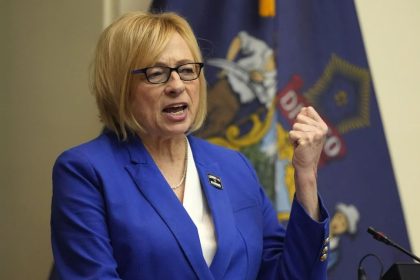FEC Says Website Won’t Violate Law By Posting Lawmakers’ Statements on Faith

WASHINGTON – The Federal Election Commission held this week that Pray.com, a free mobile application and website, won’t violate federal election laws if it invites members of Congress to produce five-minute statements on matters of faith.
Pray.com, a for-profit corporation, asked for the advisory opinion from the commission in February.
As explained in its request, Pray.com uses its platforms to connect its users “directly with faith leaders and explore faith communities.”
Most of its content is made available to site visitors for free, though about 40% is accessible only through paid subscription.
The corporation’s intention is to feature audio and video statements by members of Congress on the site.
It said it will invite all members, regardless of religious affiliation, to participate, and that each five-minute segment will be “self-narrated.”
“Pray.com will encourage participating members to respond to a list of prepared prompts, including “[w]hat does the power of prayer mean to you?” and “[w]hat is your favorite Bible verse and why?” the corporation’s letter said.
“Members will have ‘full creative approval’ over their own segments; however, Pray.com will reserve the right to edit the [recorded] message if the Member deviates from the topic of the script regarding prayer.”
All of the statements will be made accessible to the public free of charge, and might also be used in advertisements on various media (including social media and television) “as a way to showcase the breadth of content offered on the Pray.com platform.”
The Commission concluded that the federal election rules and regulations would not prohibit Pray.com from posting the described statements on its digital platforms as proposed in the request, because the activity would not result in “coordinated communications” or otherwise provide a prohibited corporate in-kind contribution to participating members who are also candidates for federal office.
Federal law and Commission regulations prohibit corporations from making contributions to candidates. A “contribution” includes “any gift, subscription, loan, advance, or deposit of money or anything of value made by any person for the purpose of influencing any election for Federal office.”
For corporations, the term “contribution” also includes “any direct or indirect payment, distribution, loan, advance, deposit, or gift of money, or any services, or anything of value … to any candidate, campaign committee, or political party or organization, in connection with any [federal] election.”
“Anything of value” encompasses all in-kind contributions, including the provision of goods or services without charge or at less than the usual and normal charge.
Under the Act and Commission regulations, a third-party’s payment for a communication coordinated with a candidate, a candidate’s authorized committee, or their agents is an in-kind contribution to the candidate.
Any person prohibited from making contributions or expenditures under the Act or Commission regulations is thus prohibited from paying for a coordinated communication.
Because the Act prohibits corporations from making contributions to candidates, corporations may not pay for coordinated communications.
“In this instance, a Member-Candidate’s statement would not be a ‘coordinated communication’ because it would not satisfy the content prong. This prong of the coordinated communication analysis applies only to communications that are either a ‘public communication’ or an ‘electioneering communication.’
The commission went on to explain that communications made over the internet are expressly exempt from the definition of ‘public communication,’ unless they are placed for a fee on another person’s website.
Similarly, it said, any communication ‘over the internet’ cannot be an electioneering communication. The request states that Pray.com proposes to disseminate member candidates’ statements exclusively over the internet on Pray.com’s own website and digital application.
“Because the activity described by the requestor would not involve the placement of Member-Candidates’ statements for a fee on another person’s website, these communications will be neither public communications nor electioneering communications.”
The commission then went on to note that it had previously considered whether for-profit corporations like Pray.com may post candidate-provided content on their own digital platforms without making an in-kind contribution to the candidates.
It said that in at least two past advisory opinions, it considered whether corporations in the business of matching contributors to candidates through the corporations’ online platforms or websites would themselves make contributions by allowing candidates to post their biographical information and issue positions on those websites.
The commission concluded that no contributions would result where the corporations acted to advance their commercial interests rather than to influence a federal election.
Similarly, outside of the internet context, the commission has previously determined that financing a candidate’s platform for speech will not result in an in-kind contribution where the invitation to speak is based on an individual’s status as a legislator rather than as a candidate, and the candidate’s remarks do not contain express advocacy or solicit contributions.
“Here, Pray.com proposes to invite all members, irrespective of party and candidate status, to provide statements for its platforms. This fact indicates that invitees will be asked to participate due to their status as legislators rather than as candidates,” the commission said.
Furthermore, the commission said, Pray.com will provide participating members with a list of questions and prompts that relate to general biographical and professional information and the members’ personal views on matters of faith.
“The posting of their statements would thus serve Pray.com’s commercial interests by increasing the volume of its freely-accessible faith-based content and potentially attracting users from diverse ideological backgrounds to its platforms — some of whom, presumably, would then choose to become paid subscribers to access the platforms’ premium content,” the commission said.
“Moreover, Pray.com will reserve the right to edit audio or video content if the participating member deviates from the topic of the script regarding prayer. Accordingly, the Commission concludes that Pray.com would not make corporate in-kind contributions to participating Member-Candidates by posting their statements on its digital platforms,” it added.
























